https://education.ufl.edu/news/files/2019/07/News-1-300x65.png
0
0
https://education.ufl.edu/news/files/2019/07/News-1-300x65.png
2009-04-20 10:49:372011-10-13 12:19:59No surprises, but painful cuts still forecast in UF's 'worst-case' budget plan
https://education.ufl.edu/news/files/2019/07/News-1-300x65.png
0
0
https://education.ufl.edu/news/files/2019/07/News-1-300x65.png
2009-03-23 16:00:472011-10-13 12:19:59College will keep undergraduate programs; preliminary budget plan announced
https://education.ufl.edu/news/files/2019/07/News-1-300x65.png
0
0
https://education.ufl.edu/news/files/2019/07/News-1-300x65.png
2009-03-12 10:07:202011-10-13 12:19:59NEA fetes retired professor Walter L. Smith
https://education.ufl.edu/news/files/2019/07/News-1-300x65.png
0
0
https://education.ufl.edu/news/files/2019/07/News-1-300x65.png
2009-03-11 14:11:022016-05-03 16:19:20coE-News: March 16, 2009, VOL 4 ISSUE 6
https://education.ufl.edu/news/files/2019/07/News-1-300x65.png
0
0
https://education.ufl.edu/news/files/2019/07/News-1-300x65.png
2009-03-10 15:05:292011-10-13 12:19:59Schoolyard Wildlife Program chosen as education 'success story' for Obama's environmental team
https://education.ufl.edu/news/files/2019/07/News-1-300x65.png
0
0
https://education.ufl.edu/news/files/2019/07/News-1-300x65.png
2009-03-09 17:04:212011-10-13 12:19:59COE scholars will be out in force at April AERA meeting
https://education.ufl.edu/news/files/2019/07/News-1-300x65.png
0
0
https://education.ufl.edu/news/files/2019/07/News-1-300x65.png
2009-03-02 13:25:272011-10-13 12:19:59Dean's Special Message re. Proposal to Reduce or Cut Undergraduate Education Programs
https://education.ufl.edu/news/files/2019/07/News-1-300x65.png
0
0
https://education.ufl.edu/news/files/2019/07/News-1-300x65.png
2009-02-18 12:31:102016-04-21 10:56:24Minus grades are coming soon!
https://education.ufl.edu/news/files/2019/07/News-1-300x65.png
0
0
https://education.ufl.edu/news/files/2019/07/News-1-300x65.png
2009-02-16 12:01:072011-10-13 12:19:59Sadler receives Early Career award for science education research
https://education.ufl.edu/news/files/2019/07/News-1-300x65.png
0
0
https://education.ufl.edu/news/files/2019/07/News-1-300x65.png
2009-02-13 14:27:422011-10-13 12:19:59Rossie named Student Advisor of Year
https://education.ufl.edu/news/files/2019/07/News-1-300x65.png
0
0
https://education.ufl.edu/news/files/2019/07/News-1-300x65.png
2009-02-13 14:07:422011-10-13 12:20:00Shermis named dean at Akron college
https://education.ufl.edu/news/files/2019/07/News-1-300x65.png
0
0
https://education.ufl.edu/news/files/2019/07/News-1-300x65.png
2009-02-13 11:36:152011-10-13 12:20:00McCray named Undergraduate Teacher of the Year
https://education.ufl.edu/news/files/2019/07/News-1-300x65.png
0
0
https://education.ufl.edu/news/files/2019/07/News-1-300x65.png
2009-02-12 14:06:112016-05-03 16:17:01coE-News: February 17, 2009, VOL 4 ISSUE 5
https://education.ufl.edu/news/files/2019/07/News-1-300x65.png
0
0
https://education.ufl.edu/news/files/2019/07/News-1-300x65.png
2009-02-12 11:58:052011-10-13 12:20:00UF institute honors 3 U.S. community colleges for notable programs
https://education.ufl.edu/news/files/2019/07/News-1-300x65.png
0
0
https://education.ufl.edu/news/files/2019/07/News-1-300x65.png
2009-02-10 16:58:302011-10-13 12:20:00Best-selling author resumes lecture series March 4 with 'Leadership and the Six Secrets of Change'
https://education.ufl.edu/news/files/2019/07/News-1-300x65.png
0
0
https://education.ufl.edu/news/files/2019/07/News-1-300x65.png
2009-02-06 11:55:042016-05-03 16:15:51coE-News: January 20, 2009, VOL 4 ISSUE 4
https://education.ufl.edu/news/files/2019/07/News-1-300x65.png
0
0
https://education.ufl.edu/news/files/2019/07/News-1-300x65.png
2009-02-05 12:52:362011-10-13 12:20:00'War Against Boys': COE professors to discuss gender equity with controversial author Feb. 18
https://education.ufl.edu/news/files/2019/07/News-1-300x65.png
0
0
https://education.ufl.edu/news/files/2019/07/News-1-300x65.png
2009-02-03 13:24:192011-10-13 12:20:00Budget Discussion Comments
https://education.ufl.edu/news/files/2019/07/News-1-300x65.png
0
0
https://education.ufl.edu/news/files/2019/07/News-1-300x65.png
2009-01-22 15:40:462011-10-13 12:20:00P.K. Yonge laboratory school seeks input to shape vision for new 'campus of the future'
https://education.ufl.edu/news/files/2019/07/News-1-300x65.png
0
0
https://education.ufl.edu/news/files/2019/07/News-1-300x65.png
2009-01-22 14:27:582011-10-13 12:20:00Book of the Year award 'reflects' well on CSI director
https://education.ufl.edu/news/files/2019/07/News-1-300x65.png
0
0
https://education.ufl.edu/news/files/2019/07/News-1-300x65.png
2009-01-22 08:59:142011-10-13 12:20:00Dean's Message: When the going gets tough, follow the Gators' lead
https://education.ufl.edu/news/files/2019/07/News-1-300x65.png
0
0
https://education.ufl.edu/news/files/2019/07/News-1-300x65.png
2009-01-16 13:05:532011-10-13 12:20:00Bereavement scholar-author to lead UF workshop on grief Feb. 26
https://education.ufl.edu/news/files/2019/07/News-1-300x65.png
0
0
https://education.ufl.edu/news/files/2019/07/News-1-300x65.png
2009-01-15 11:27:342016-05-06 13:23:06coE-News: January 21, 2009
https://education.ufl.edu/news/files/2019/07/News-1-300x65.png
0
0
https://education.ufl.edu/news/files/2019/07/News-1-300x65.png
2009-01-13 10:15:332011-10-13 12:20:00Education head librarian receives national honor
https://education.ufl.edu/news/files/2019/07/News-1-300x65.png
0
0
https://education.ufl.edu/news/files/2019/07/News-1-300x65.png
2009-01-06 10:58:082011-10-13 12:20:00ProTeach student killed in accident
https://education.ufl.edu/news/files/2019/07/News-1-300x65.png
0
0
https://education.ufl.edu/news/files/2019/07/News-1-300x65.png
2008-12-02 14:22:312011-10-13 12:20:01Visiting lecturer to explore promise of video games as hot learning tool
https://education.ufl.edu/news/files/2019/07/News-1-300x65.png
0
0
https://education.ufl.edu/news/files/2019/07/News-1-300x65.png
2008-11-20 13:32:292011-10-13 12:20:01PK Yonge Civics Class on the evening news
https://education.ufl.edu/news/files/2019/07/News-1-300x65.png
0
0
https://education.ufl.edu/news/files/2019/07/News-1-300x65.png
2008-11-18 08:28:112011-10-13 12:20:01In Memoriam - William H. Drummond (1921-2008)
https://education.ufl.edu/news/files/2019/07/News-1-300x65.png
0
0
https://education.ufl.edu/news/files/2019/07/News-1-300x65.png
2008-11-17 11:37:212016-05-10 13:57:20coE-News: November 17, 2008, VOL 4 ISSUE 3
https://education.ufl.edu/news/files/2019/07/News-1-300x65.png
0
0
https://education.ufl.edu/news/files/2019/07/News-1-300x65.png
2008-11-17 10:42:322011-10-13 12:20:01AMCD/ACES Announce the 2nd Annual International Conference on Culturally Competent Disaster Response
https://education.ufl.edu/news/files/2019/07/News-1-300x65.png
0
0
https://education.ufl.edu/news/files/2019/07/News-1-300x65.png
2008-11-14 15:58:012011-10-13 12:20:01Journeys
https://education.ufl.edu/news/files/2019/07/News-1-300x65.png
0
0
https://education.ufl.edu/news/files/2019/07/News-1-300x65.png
2008-11-14 09:18:122016-05-06 14:02:15UF signs cooperative agreement with Polish university to advance inclusion of students with special needs
https://education.ufl.edu/news/files/2019/07/News-1-300x65.png
0
0
https://education.ufl.edu/news/files/2019/07/News-1-300x65.png
2008-11-14 09:13:042011-10-13 12:20:01Retention downplayed as teacher-shortage solution in first talk of COE's distinguished-speaker series
https://education.ufl.edu/news/files/2019/07/News-1-300x65.png
0
0
https://education.ufl.edu/news/files/2019/07/News-1-300x65.png
2008-11-14 09:05:112011-10-13 12:20:01Dean's Message: 'Yes We Can': post-election ponderings on making a difference in education
https://education.ufl.edu/news/files/2019/07/News-1-300x65.png
0
0
https://education.ufl.edu/news/files/2019/07/News-1-300x65.png
2008-11-13 11:04:132011-10-13 12:20:01KDPi stages Fun Science Fair for after-school students
https://education.ufl.edu/news/files/2019/07/News-1-300x65.png
0
0
https://education.ufl.edu/news/files/2019/07/News-1-300x65.png
2008-10-29 08:26:052011-10-13 12:20:01'Where have all the teachers gone?' UF guest lecturer pinpoints turnover as key indicator of teacher shortage
https://education.ufl.edu/news/files/2019/07/News-1-300x65.png
0
0
https://education.ufl.edu/news/files/2019/07/News-1-300x65.png
2008-10-17 16:20:192016-05-03 15:30:04coE-News: October 15, 2008, VOL 4 ISSUE 2
https://education.ufl.edu/news/files/2019/07/News-1-300x65.png
0
0
https://education.ufl.edu/news/files/2019/07/News-1-300x65.png
2008-10-15 10:01:392011-10-13 12:20:01New UF initiatives strive to help budgets and environment
https://education.ufl.edu/news/files/2019/07/News-1-300x65.png
0
0
https://education.ufl.edu/news/files/2019/07/News-1-300x65.png
2008-10-13 12:17:572011-10-13 12:20:023-Minute Interview . . . on Florida's Emerging State College System
https://education.ufl.edu/news/files/2019/07/News-1-300x65.png
0
0
https://education.ufl.edu/news/files/2019/07/News-1-300x65.png
2008-10-10 16:33:192011-10-13 12:20:02UF awards 'Opportunity' grant for Project Read Aloud
https://education.ufl.edu/news/files/2019/07/News-1-300x65.png
0
0
https://education.ufl.edu/news/files/2019/07/News-1-300x65.png
2008-10-10 16:21:552011-10-13 12:20:02Learning center will help top educators share secrets of teaching success
https://education.ufl.edu/news/files/2019/07/News-1-300x65.png
0
0
https://education.ufl.edu/news/files/2019/07/News-1-300x65.png
2008-09-17 15:20:172016-05-09 15:11:40coE-News: September 15, 2008, VOL 4 ISSUE 1
https://education.ufl.edu/news/files/2019/07/News-1-300x65.png
0
0
https://education.ufl.edu/news/files/2019/07/News-1-300x65.png
2008-09-11 11:48:162011-10-13 12:20:02CROP brings new meaning to “teaching to the test”
https://education.ufl.edu/news/files/2019/07/News-1-300x65.png
0
0
https://education.ufl.edu/news/files/2019/07/News-1-300x65.png
2008-09-10 17:08:152011-10-13 12:20:02Dean's Message: Cuts and Restructuring - or, I Know What You Did Last Summer
https://education.ufl.edu/news/files/2019/07/News-1-300x65.png
0
0
https://education.ufl.edu/news/files/2019/07/News-1-300x65.png
2008-09-09 14:38:542011-10-13 12:20:02Author to discuss “The Trouble with Boys”
https://education.ufl.edu/news/files/2019/07/News-1-300x65.png
0
0
https://education.ufl.edu/news/files/2019/07/News-1-300x65.png
2008-09-09 14:00:402011-10-13 12:20:02Bert Sharp, former COE dean, dies at 81
https://education.ufl.edu/news/files/2019/07/News-1-300x65.png
0
0
https://education.ufl.edu/news/files/2019/07/News-1-300x65.png
2008-08-18 12:43:412011-10-13 12:20:02Troy Sadler: Hands-On Science
https://education.ufl.edu/news/files/2019/07/News-1-300x65.png
0
0
https://education.ufl.edu/news/files/2019/07/News-1-300x65.png
2008-08-18 12:13:032011-10-13 12:20:02Rethinking Education for English Language Learners
https://education.ufl.edu/news/files/2019/07/News-1-300x65.png
0
0
https://education.ufl.edu/news/files/2019/07/News-1-300x65.png
2008-08-13 14:54:522016-05-06 14:16:58Getting past the gatekeepers in science & math
https://education.ufl.edu/news/files/2019/07/News-1-300x65.png
0
0
https://education.ufl.edu/news/files/2019/07/News-1-300x65.png
2008-08-11 15:43:382011-10-13 12:20:02Institutional review boards hampering social sciences research - UF study
Scroll to top

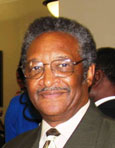
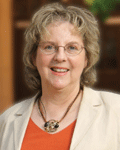 Decision on budget reduction proposal will come after legislative session ends May 1
Decision on budget reduction proposal will come after legislative session ends May 1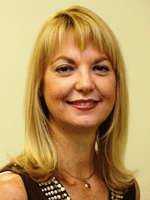 Schoolyard Wildlife Program chosen as ‘success story’ for Obama’s environmental team
Schoolyard Wildlife Program chosen as ‘success story’ for Obama’s environmental team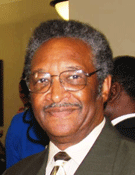 NEA fetes retired ex-professor Walter L. Smith
NEA fetes retired ex-professor Walter L. Smith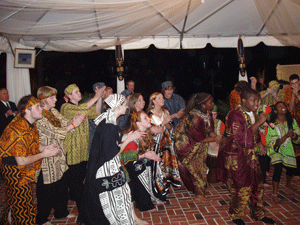



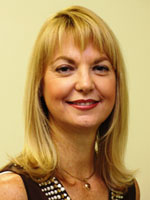


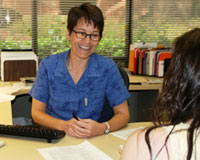
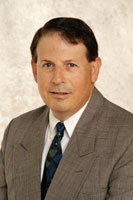

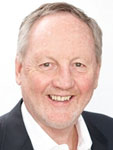 Best-selling author Michael Fullan, an international scholar on school and education reform, will speak on “Leadership and the Six Secrets of Change” March 4 at 3:30 p.m., when he visits the UF College of Education campus to present the third distinguished lecture in the college-sponsored series, “21st Century Pathways to Education.” (
Best-selling author Michael Fullan, an international scholar on school and education reform, will speak on “Leadership and the Six Secrets of Change” March 4 at 3:30 p.m., when he visits the UF College of Education campus to present the third distinguished lecture in the college-sponsored series, “21st Century Pathways to Education.” (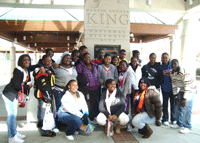 College Reach-Out Programs (CROP) from UF’s College of Education and other Florida sites took 20 Florida high school students on a trip to Atlanta Jan. 15-19 to participate in Martin Luther King Celebration festivities. The touring group included students from Alachua County (from UF CROP schools), Marion County (Central Florida Community College CROP) and Crystal River High School in Citrus County. Despite chilling weather, the group visited several Atlanta-area college campuses including Morehouse, Spellman, Clark and Georgia State. They also toured the MLK museums (pictured right), King’s birth home and a grave monument of Dr. King and his wife. The students also explored the Georgia Aquarium and World of Coke attractions, and some were even bold enough to sample the fried calamari (squid) at the aquarium food court. “These trips are more than just a walk around a college campus–they are cultural experiences the students will never forget,” UF CROP Director Bobby Welch said. CROP is a statewide project designed to increase the number of educationally and economically disadvantaged students who successfully complete a postsecondary education. Participating students are introduced to the academic world beyond high school by Florida higher education institutions.
College Reach-Out Programs (CROP) from UF’s College of Education and other Florida sites took 20 Florida high school students on a trip to Atlanta Jan. 15-19 to participate in Martin Luther King Celebration festivities. The touring group included students from Alachua County (from UF CROP schools), Marion County (Central Florida Community College CROP) and Crystal River High School in Citrus County. Despite chilling weather, the group visited several Atlanta-area college campuses including Morehouse, Spellman, Clark and Georgia State. They also toured the MLK museums (pictured right), King’s birth home and a grave monument of Dr. King and his wife. The students also explored the Georgia Aquarium and World of Coke attractions, and some were even bold enough to sample the fried calamari (squid) at the aquarium food court. “These trips are more than just a walk around a college campus–they are cultural experiences the students will never forget,” UF CROP Director Bobby Welch said. CROP is a statewide project designed to increase the number of educationally and economically disadvantaged students who successfully complete a postsecondary education. Participating students are introduced to the academic world beyond high school by Florida higher education institutions.
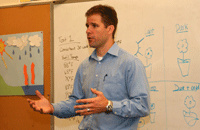
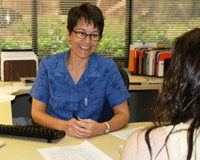
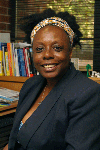 Frazier, K. N., West-Olatunji, C., St Juste, S., & Goodman, R. (2009). Transgenerational trauma & CSA: Reconceptualizing cases involving young survivors of child sexual abuse.” Journal of Mental Health Counseling, 31(1), 22-33.
Frazier, K. N., West-Olatunji, C., St Juste, S., & Goodman, R. (2009). Transgenerational trauma & CSA: Reconceptualizing cases involving young survivors of child sexual abuse.” Journal of Mental Health Counseling, 31(1), 22-33.  Gagnon, J. C. (2008). “State level curricular, assessment, and accountability policies, practices, and philosophies for exclusionary school settings.” Journal of Special Education, OnlineFirst PDF
Gagnon, J. C. (2008). “State level curricular, assessment, and accountability policies, practices, and philosophies for exclusionary school settings.” Journal of Special Education, OnlineFirst PDF  I recall starting my January 2007 column by noting that the UF football team had just defeated Ohio State for the BCS National Championship. Now, two years later, I have the same opportunity. While we celebrated victory in both title games, a striking difference is how the second victory was achieved- a tough, gritty, pertinacious effort against a strong, formidable Oklahoma team. The Gators’ determination and resolve mirrors how we must approach the task of dealing with the severe fiscal crises at the state and national levels. We will have to buckle down and ask hard, and sometimes, painful questions about the College’s strategic directions, what goals we want to achieve, and how we intend to achieve these goals with diminished resources. (
I recall starting my January 2007 column by noting that the UF football team had just defeated Ohio State for the BCS National Championship. Now, two years later, I have the same opportunity. While we celebrated victory in both title games, a striking difference is how the second victory was achieved- a tough, gritty, pertinacious effort against a strong, formidable Oklahoma team. The Gators’ determination and resolve mirrors how we must approach the task of dealing with the severe fiscal crises at the state and national levels. We will have to buckle down and ask hard, and sometimes, painful questions about the College’s strategic directions, what goals we want to achieve, and how we intend to achieve these goals with diminished resources. ( Dorothy S. Becvar, an internationally recognized scholar and author on death-related bereavement and grief, will lead an all-day workshop titled “In the Presence of Grief,” Feb. 26 at the University of Florida College of Education. Becvar’s presentation, to be held on campus at the Norman Hall Terrace Room from 8:30 a.m. to 4 p.m., is part of the college’s long-running Arthur G. Peterson Death Education Lecture Series. The workshop is geared to UF faculty members, students and staff, and to local clinical practitioners, but the general public also is invited. Continuing education units will be offered to licensed practitioners for a nominal fee of $25. Seating is limited to 50 participants and advance reservations are required. (
Dorothy S. Becvar, an internationally recognized scholar and author on death-related bereavement and grief, will lead an all-day workshop titled “In the Presence of Grief,” Feb. 26 at the University of Florida College of Education. Becvar’s presentation, to be held on campus at the Norman Hall Terrace Room from 8:30 a.m. to 4 p.m., is part of the college’s long-running Arthur G. Peterson Death Education Lecture Series. The workshop is geared to UF faculty members, students and staff, and to local clinical practitioners, but the general public also is invited. Continuing education units will be offered to licensed practitioners for a nominal fee of $25. Seating is limited to 50 participants and advance reservations are required. ( COE, PKY employees make holiday wishes come true
COE, PKY employees make holiday wishes come true


 The College marked International Education Week in November with a half-day event Nov. 19 celebrating the cultures of students from a wide variety of countries who come to Norman Hall to pursue their studies. Keynote speaker Anita Anantharam (bottom left), assistant professor at UF’s Center for Women’s Studies and Gender Research, spoke on “Fostering Our Global Community”; two panels discussions also were held-one (bottom right) addressing the challenges faced by international teaching assistants, and the other (featuring faculty members Cirecie West-Olatunji and Edil Torres Rivera) examining the cultural implications for foreign students training future American practitioners in counselor education. The event was coordinated by STL Assistant Scholar John Bailey and media-communications coordinator James Osterhout of the Institute of Higher Education. International Education Week, celebrated yearly in more than 100 countries, is a joint initiative of the U.S. departments of State and Education.
The College marked International Education Week in November with a half-day event Nov. 19 celebrating the cultures of students from a wide variety of countries who come to Norman Hall to pursue their studies. Keynote speaker Anita Anantharam (bottom left), assistant professor at UF’s Center for Women’s Studies and Gender Research, spoke on “Fostering Our Global Community”; two panels discussions also were held-one (bottom right) addressing the challenges faced by international teaching assistants, and the other (featuring faculty members Cirecie West-Olatunji and Edil Torres Rivera) examining the cultural implications for foreign students training future American practitioners in counselor education. The event was coordinated by STL Assistant Scholar John Bailey and media-communications coordinator James Osterhout of the Institute of Higher Education. International Education Week, celebrated yearly in more than 100 countries, is a joint initiative of the U.S. departments of State and Education.




 Former longtime College of Education faculty member Glenna Dodson Carr, Ed.D., died Oct. 19, 2008. She was 81. Carr served on the COE faculty for more than 40 years. Carr began her UF career in 1956 in the College’s Department of Business Education. She received her Ed.D. in business education from UF in 1959, the same summer she joined the college’s graduate faculty. After the business education program was moved to FAMU in 1980, she worked in the College’s Center for Economic Education, serving first as co-director and then as the center’s director. In addition to her teaching duties, Dr. Carr also served the university and the greater community with her work in various projects, including the Florida Migrant Compensation Learn and Earn Project, and on several university committees. In a letter accepting Dr. Carr’s notice of retirement in 2001 from the School of Teaching and Learning due to ill health, Dorene Ross, then acting director of the School of Teaching and Learning, noted that Dr. Carr “provided for young women faculty in this College a clear model of a strong, politically active woman faculty member,” and “helped to break ground for younger women faculty through [her] actions and visibility.” In March of 2001, the university granted Dr. Carr with emeritus status for her many years of meritorious service.
Former longtime College of Education faculty member Glenna Dodson Carr, Ed.D., died Oct. 19, 2008. She was 81. Carr served on the COE faculty for more than 40 years. Carr began her UF career in 1956 in the College’s Department of Business Education. She received her Ed.D. in business education from UF in 1959, the same summer she joined the college’s graduate faculty. After the business education program was moved to FAMU in 1980, she worked in the College’s Center for Economic Education, serving first as co-director and then as the center’s director. In addition to her teaching duties, Dr. Carr also served the university and the greater community with her work in various projects, including the Florida Migrant Compensation Learn and Earn Project, and on several university committees. In a letter accepting Dr. Carr’s notice of retirement in 2001 from the School of Teaching and Learning due to ill health, Dorene Ross, then acting director of the School of Teaching and Learning, noted that Dr. Carr “provided for young women faculty in this College a clear model of a strong, politically active woman faculty member,” and “helped to break ground for younger women faculty through [her] actions and visibility.” In March of 2001, the university granted Dr. Carr with emeritus status for her many years of meritorious service. Retired College of Education faculty member William H. Drummond, Ed.D., died Nov. 15, 2008. He was 87 years old. Drummond was a faculty member of the college’s Curriculum and Instruction department from 1972 to 1986, when he received Professor Emeritus status upon retirement. He had served as chairman of the division of education at Vanderbilt’s Peabody College prior to joining the UF faculty. Retired UF education faculty member William Hedges, one of Drummond’s best friends and a fellow bridge player (along with their wives) for more than 40 years, was partially responsible for recruiting Drummond to UF. Hedges credits Drummond with being “a significant contributor to the improvement of public education in Florida as he worked closely with the State Department and then-Chancellor of Education, Charley Reed.” Hedges said Drummond “had an amazing ability to listen to others and to zero in on ways to bring about consensus.” Drummond’s special interests in education ranged from teacher education and certification to organizational development. He was highly regarded by his students as an engaging and demanding teacher and mentor. Retired faculty member Paul George recalled that “Bill had a life-long capability to get to the heart of the matter, whatever it might be, and to do so in a way that brought people to agree with him and to love him at the same time.”
Retired College of Education faculty member William H. Drummond, Ed.D., died Nov. 15, 2008. He was 87 years old. Drummond was a faculty member of the college’s Curriculum and Instruction department from 1972 to 1986, when he received Professor Emeritus status upon retirement. He had served as chairman of the division of education at Vanderbilt’s Peabody College prior to joining the UF faculty. Retired UF education faculty member William Hedges, one of Drummond’s best friends and a fellow bridge player (along with their wives) for more than 40 years, was partially responsible for recruiting Drummond to UF. Hedges credits Drummond with being “a significant contributor to the improvement of public education in Florida as he worked closely with the State Department and then-Chancellor of Education, Charley Reed.” Hedges said Drummond “had an amazing ability to listen to others and to zero in on ways to bring about consensus.” Drummond’s special interests in education ranged from teacher education and certification to organizational development. He was highly regarded by his students as an engaging and demanding teacher and mentor. Retired faculty member Paul George recalled that “Bill had a life-long capability to get to the heart of the matter, whatever it might be, and to do so in a way that brought people to agree with him and to love him at the same time.” The National Staff Development Council recently presented its 2008 Book of the Year award to co-authors Nancy Dana, COE professor and director of the Center for School Improvement, and her colleague, former COE Professor Diane Yendol-Hoppey, for their most recent collaboration. “The Reflective Educator’s Guide to Professional Development: Coaching Inquiry-Oriented Learning Communities” provides strategies for integrating “inquiry” or action research and professional learning communities (PLCs)–two concepts Dana finds essential to teacher professional development. “By weaving these two processes together into one coherent professional development approach,” says Dana, “these two mechanisms can enhance each other and magnify the already powerful professional development practices occurring in many schools and districts across the country.” Dana has another book coming out this year titled “Leading with Passion and Knowledge: The Principal as Action Researcher,” in which she turns her reflective lens onto the role of inquiry in leadership for school principals. Click here to link with Corwin Press
The National Staff Development Council recently presented its 2008 Book of the Year award to co-authors Nancy Dana, COE professor and director of the Center for School Improvement, and her colleague, former COE Professor Diane Yendol-Hoppey, for their most recent collaboration. “The Reflective Educator’s Guide to Professional Development: Coaching Inquiry-Oriented Learning Communities” provides strategies for integrating “inquiry” or action research and professional learning communities (PLCs)–two concepts Dana finds essential to teacher professional development. “By weaving these two processes together into one coherent professional development approach,” says Dana, “these two mechanisms can enhance each other and magnify the already powerful professional development practices occurring in many schools and districts across the country.” Dana has another book coming out this year titled “Leading with Passion and Knowledge: The Principal as Action Researcher,” in which she turns her reflective lens onto the role of inquiry in leadership for school principals. Click here to link with Corwin Press 
 The Florida Music Educators Association awarded P.K. Yonge its 2008 Music Education Enrollment Award. Presented at FMEA’s annual conference earlier this month, the award is given to middle and high schools with more than 35 percent of their students enrolled in music classes. Over 40 percent of PKY’s middle and high school students are enrolled in the school’s music program and all elementary students receive weekly music classes. The Music Education Enrollment Award is held for three years. During that time P.K. Yonge will serve as a State of Florida demonstration school, providing data and assistance on developing and implementing a successful music education curriculum.
The Florida Music Educators Association awarded P.K. Yonge its 2008 Music Education Enrollment Award. Presented at FMEA’s annual conference earlier this month, the award is given to middle and high schools with more than 35 percent of their students enrolled in music classes. Over 40 percent of PKY’s middle and high school students are enrolled in the school’s music program and all elementary students receive weekly music classes. The Music Education Enrollment Award is held for three years. During that time P.K. Yonge will serve as a State of Florida demonstration school, providing data and assistance on developing and implementing a successful music education curriculum. The Miami Herald (1/12/2009)- Dorene Ross, STL
The Miami Herald (1/12/2009)- Dorene Ross, STL
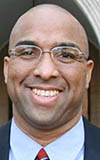
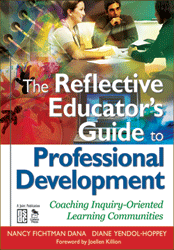 The National Staff Development Council recently presented its 2008 Book of the Year award to co-authors Nancy Dana, COE professor and director of the Center for School Improvement, and her colleague, former COE Professor Diane Yendol-Hoppey, for their most recent collaboration. “The Reflective Educator’s Guide to Professional Development: Coaching Inquiry-Oriented Learning Communities” provides strategies for integrating “inquiry” or action research and professional learning communities (PLCs)–two concepts Dana finds essential to teacher professional development. “By weaving these two processes together into one coherent professional development approach,” says Dana, “these two mechanisms can enhance each other and magnify the already powerful professional development practices occurring in many schools and districts across the country.” Dana has another book coming out this year titled “Leading with Passion and Knowledge: The Principal as Action Researcher,” in which she turns her reflective lens onto the role of inquiry in leadership for school principals. Click here to link with Corwin Press
The National Staff Development Council recently presented its 2008 Book of the Year award to co-authors Nancy Dana, COE professor and director of the Center for School Improvement, and her colleague, former COE Professor Diane Yendol-Hoppey, for their most recent collaboration. “The Reflective Educator’s Guide to Professional Development: Coaching Inquiry-Oriented Learning Communities” provides strategies for integrating “inquiry” or action research and professional learning communities (PLCs)–two concepts Dana finds essential to teacher professional development. “By weaving these two processes together into one coherent professional development approach,” says Dana, “these two mechanisms can enhance each other and magnify the already powerful professional development practices occurring in many schools and districts across the country.” Dana has another book coming out this year titled “Leading with Passion and Knowledge: The Principal as Action Researcher,” in which she turns her reflective lens onto the role of inquiry in leadership for school principals. Click here to link with Corwin Press 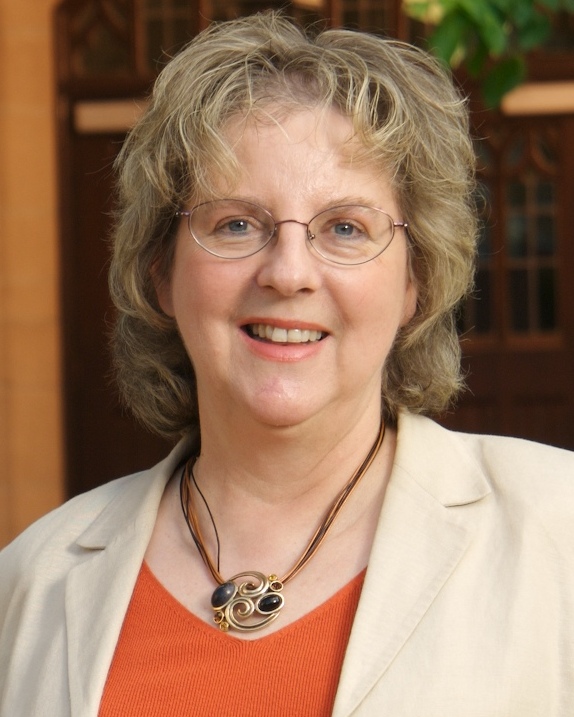
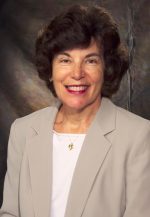

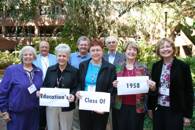







 Former longtime College of Education faculty member Glenna Dodson Carr, Ed.D., died Oct. 19, 2008. She was 81. Carr served on the COE faculty for more than 40 years. Carr began her UF career in 1956 in the College’s Department of Business Education. She received her Ed.D. in business education from UF in 1959, the same summer she joined the college’s graduate faculty. After the business education program was moved to FAMU in 1980, she worked in the College’s Center for Economic Education, serving first as co-director and then as the center’s director. In addition to her teaching duties, Dr. Carr also served the university and the greater community with her work in various projects, including the Florida Migrant Compensation Learn and Earn Project, and on several university committees. In a letter accepting Dr. Carr’s notice of retirement in 2001 from the School of Teaching and Learning due to ill health, Dorene Ross, then acting director of the School of Teaching and Learning, noted that Dr. Carr “provided for young women faculty in this College a clear model of a strong, politically active woman faculty member,” and “helped to break ground for younger women faculty through [her] actions and visibility.” In March of 2001, the university granted Dr. Carr with emeritus status for her many years of meritorious service.
Former longtime College of Education faculty member Glenna Dodson Carr, Ed.D., died Oct. 19, 2008. She was 81. Carr served on the COE faculty for more than 40 years. Carr began her UF career in 1956 in the College’s Department of Business Education. She received her Ed.D. in business education from UF in 1959, the same summer she joined the college’s graduate faculty. After the business education program was moved to FAMU in 1980, she worked in the College’s Center for Economic Education, serving first as co-director and then as the center’s director. In addition to her teaching duties, Dr. Carr also served the university and the greater community with her work in various projects, including the Florida Migrant Compensation Learn and Earn Project, and on several university committees. In a letter accepting Dr. Carr’s notice of retirement in 2001 from the School of Teaching and Learning due to ill health, Dorene Ross, then acting director of the School of Teaching and Learning, noted that Dr. Carr “provided for young women faculty in this College a clear model of a strong, politically active woman faculty member,” and “helped to break ground for younger women faculty through [her] actions and visibility.” In March of 2001, the university granted Dr. Carr with emeritus status for her many years of meritorious service. Retired College of Education faculty member William H. Drummond, Ed.D., died Nov. 15, 2008. He was 87 years old. Drummond was a faculty member of the college’s Curriculum and Instruction department from 1972 to 1986, when he received Professor Emeritus status upon retirement. He had served as chairman of the division of education at Vanderbilt’s Peabody College prior to joining the UF faculty. Retired UF education faculty member William Hedges, one of Drummond’s best friends and a fellow bridge player (along with their wives) for more than 40 years, was partially responsible for recruiting Drummond to UF. Hedges credits Drummond with being “a significant contributor to the improvement of public education in Florida as he worked closely with the State Department and then-Chancellor of Education, Charley Reed.” Hedges said Drummond “had an amazing ability to listen to others and to zero in on ways to bring about consensus.” Drummond’s special interests in education ranged from teacher education and certification to organizational development. He was highly regarded by his students as an engaging and demanding teacher and mentor. Retired faculty member Paul George recalled that “Bill had a life-long capability to get to the heart of the matter, whatever it might be, and to do so in a way that brought people to agree with him and to love him at the same time.”
Retired College of Education faculty member William H. Drummond, Ed.D., died Nov. 15, 2008. He was 87 years old. Drummond was a faculty member of the college’s Curriculum and Instruction department from 1972 to 1986, when he received Professor Emeritus status upon retirement. He had served as chairman of the division of education at Vanderbilt’s Peabody College prior to joining the UF faculty. Retired UF education faculty member William Hedges, one of Drummond’s best friends and a fellow bridge player (along with their wives) for more than 40 years, was partially responsible for recruiting Drummond to UF. Hedges credits Drummond with being “a significant contributor to the improvement of public education in Florida as he worked closely with the State Department and then-Chancellor of Education, Charley Reed.” Hedges said Drummond “had an amazing ability to listen to others and to zero in on ways to bring about consensus.” Drummond’s special interests in education ranged from teacher education and certification to organizational development. He was highly regarded by his students as an engaging and demanding teacher and mentor. Retired faculty member Paul George recalled that “Bill had a life-long capability to get to the heart of the matter, whatever it might be, and to do so in a way that brought people to agree with him and to love him at the same time.”
 UF Today (Winter 2008)—P.K. Yonge Developmental Research School
UF Today (Winter 2008)—P.K. Yonge Developmental Research School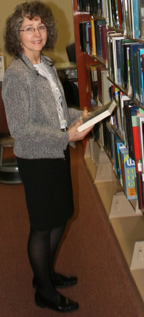
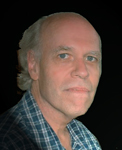
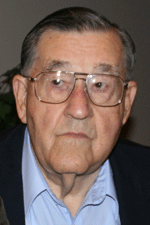
 KDPi stages Fun Science Fair for after-school students
KDPi stages Fun Science Fair for after-school students There’s a new way you can ensure your place in the history—and the
There’s a new way you can ensure your place in the history—and the “Journeys,”a poem byEileen Jones,Educational Administration and Policy program assistant, was published in the annual poetry anthology Collected Whispers. This is the eighth poem Jones has published, in addition to a number of personal essays. ”Journeys” was adapted from an essay Jones wrote when her daughter and two friends turned 20 and were beginning their “journey” toward adulthood. (
“Journeys,”a poem byEileen Jones,Educational Administration and Policy program assistant, was published in the annual poetry anthology Collected Whispers. This is the eighth poem Jones has published, in addition to a number of personal essays. ”Journeys” was adapted from an essay Jones wrote when her daughter and two friends turned 20 and were beginning their “journey” toward adulthood. ( PK Yonge Civics class on the evening news
PK Yonge Civics class on the evening news The Gainesville Sun covered Jones’ talk as part of the History of Science 2008 Fall Colloquium sponsored by UF’s History of Science Society. Jones’ talk was titled “Don’t know Much about History,” and addressed a detrimental lack of a historical perspective in high school students regarding science. According to Jones, “A historical perspective should be used to guide modern decisions.”
The Gainesville Sun covered Jones’ talk as part of the History of Science 2008 Fall Colloquium sponsored by UF’s History of Science Society. Jones’ talk was titled “Don’t know Much about History,” and addressed a detrimental lack of a historical perspective in high school students regarding science. According to Jones, “A historical perspective should be used to guide modern decisions.”
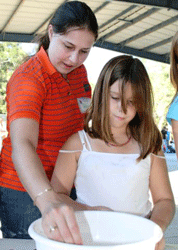
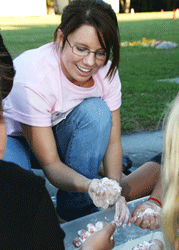
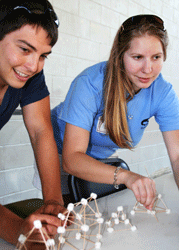
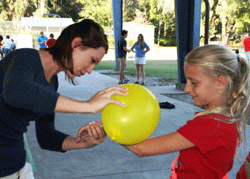
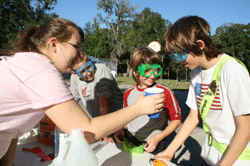
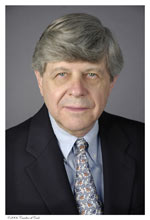
 3-MINUTE INTERVIEW: Q&A with Professor Dale Campbell on Florida’s emerging state college system
3-MINUTE INTERVIEW: Q&A with Professor Dale Campbell on Florida’s emerging state college system It’s one of the hottest topics in education today. Are boys, as a group, really falling behind in school? Are educators unintentionally doing something to cause the lag—or is the problem in the culture outside the classroom? Newsweek writer Peg Tyre shook up popular thinking on the subject with her cover story, “The Boy Crisis.” Now she has penned a book, The Trouble with Boys, which further explores the topic. Tyre will visit UF Oct. 28 to discuss her book, in a free symposium from 4:30-6 p.m. in the Norman Terrace Room. Limited seating still available, so please RSVP to Rosie Warner at
It’s one of the hottest topics in education today. Are boys, as a group, really falling behind in school? Are educators unintentionally doing something to cause the lag—or is the problem in the culture outside the classroom? Newsweek writer Peg Tyre shook up popular thinking on the subject with her cover story, “The Boy Crisis.” Now she has penned a book, The Trouble with Boys, which further explores the topic. Tyre will visit UF Oct. 28 to discuss her book, in a free symposium from 4:30-6 p.m. in the Norman Terrace Room. Limited seating still available, so please RSVP to Rosie Warner at 
 TOPIC: Biotechnology career education
TOPIC: Biotechnology career education Cynthia C. Griffin (PI), UF Special Education
Cynthia C. Griffin (PI), UF Special Education Mendez, J.P. & Mendoza, P. (2008). The implications of financial aid packages on African American student retention. National Association of Student Affairs Professionals Journal, 11(1).
Mendez, J.P. & Mendoza, P. (2008). The implications of financial aid packages on African American student retention. National Association of Student Affairs Professionals Journal, 11(1).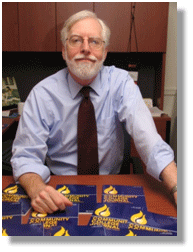


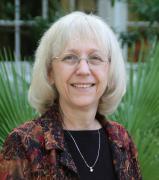
 ‘Social bullying’ linked to adult depression
‘Social bullying’ linked to adult depression Black Student Assembly honors Conwill
Black Student Assembly honors Conwill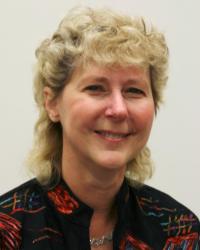 State Department asks Ryndak to speak on special education issues in Ukraine
State Department asks Ryndak to speak on special education issues in Ukraine Groundbreaking educational gaming handbook hits the press
Groundbreaking educational gaming handbook hits the press Torres-Rivera, E., Nash, S., Sew, C. W. B. , & Ibrahim, S. B. (2008). Training school counselors in Singapore: First impressions of a multicultural challenge. Journal of Counseling and Development, 86, 219-223.
Torres-Rivera, E., Nash, S., Sew, C. W. B. , & Ibrahim, S. B. (2008). Training school counselors in Singapore: First impressions of a multicultural challenge. Journal of Counseling and Development, 86, 219-223. Bert Sharp, former COE dean and faculty member
Bert Sharp, former COE dean and faculty member Associated Press (07/23/08)—Erik Black, graduate student
Associated Press (07/23/08)—Erik Black, graduate student Fort Myers News-Press (05/25/08)—Associate Professor Zhihui Fang
Fort Myers News-Press (05/25/08)—Associate Professor Zhihui Fang


